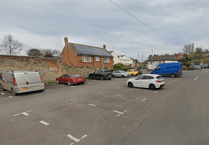More must be done to protect the public from entering sewage-contaminated bathing water, West Somerset’s MP has urged.
MP Ian Liddell-Grainger says bathers need to be kept fully informed as to whether it is safe to swim both at the seaside and in rivers - and to fail to alert them could have devastating outcomes for public health.
Mr Liddell-Grainger, MP for Bridgwater and West Somerset, wants more prominent signage displayed on designated bathing beaches where an army of coast-based volunteers is currently responsible for posting alerts whenever water quality is deemed too poor for bathing.
“It is not, sadly, going to do much for the image of a seaside resort to display huge signs advising people not to swim but if companies like Wessex Water are going to continue releasing sewage into the sea through storm overflows then we have no option,” he said.
“The fact is that only recently has the extent of this problem been uncovered. But now it is out in the open we need to step up levels of public protection.”
Mr Liddell-Granger said warnings should be extended inland along rivers like the Parrett and Tone, both popular with bathers and canoeists.
“It’s always been a risky business swimming in these rivers because of the unavoidable run-off from farmland which they carry but if you then factor in the potential for sewage-related contamination as well then clearly it becomes unacceptably hazardous,” he said.
“I also believe those warning signs should have the name of Wessex Water prominently displayed so that public can be left in no doubt as to precisely which company is causing the problem.
“I am told there are warning notices which are activated when necessary by volunteers at the designated bathing beaches such as Minehead, Dunster and Porlock Weir. I have never noticed these signs and I’m sure thousands of other people - many of them holidaymakers - have passed them without giving them a second look.
“We must make such signs and the message they are designed to convey far more prominent.
“And I would suggest that relying on the alerts being posted by volunteers - who may not always be available - is totally unsatisfactory, particularly when the Environment Agency has plenty of staff on its books and could ensure the job is done promptly as soon as the danger signals are detected.”
Wessex Water has been asked to comment.





Comments
This article has no comments yet. Be the first to leave a comment.